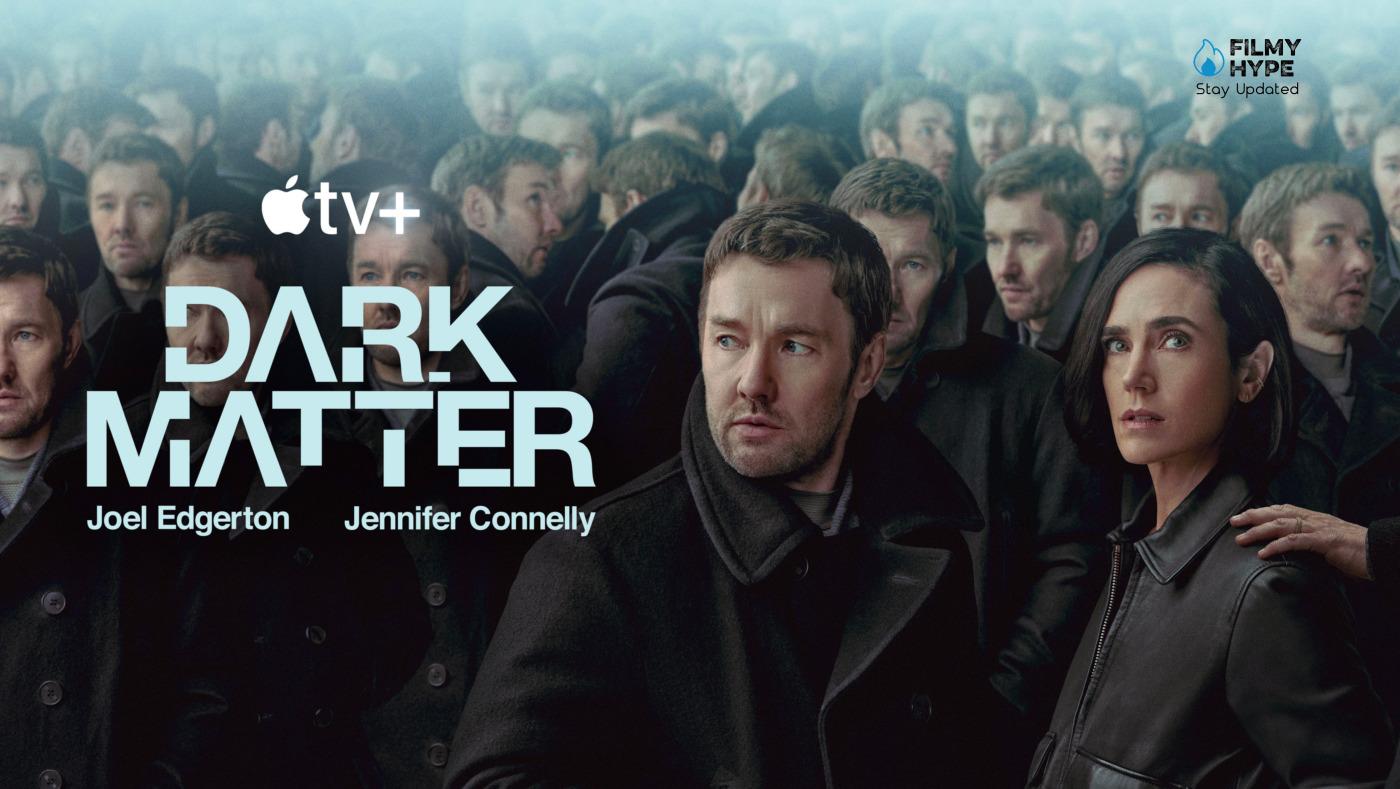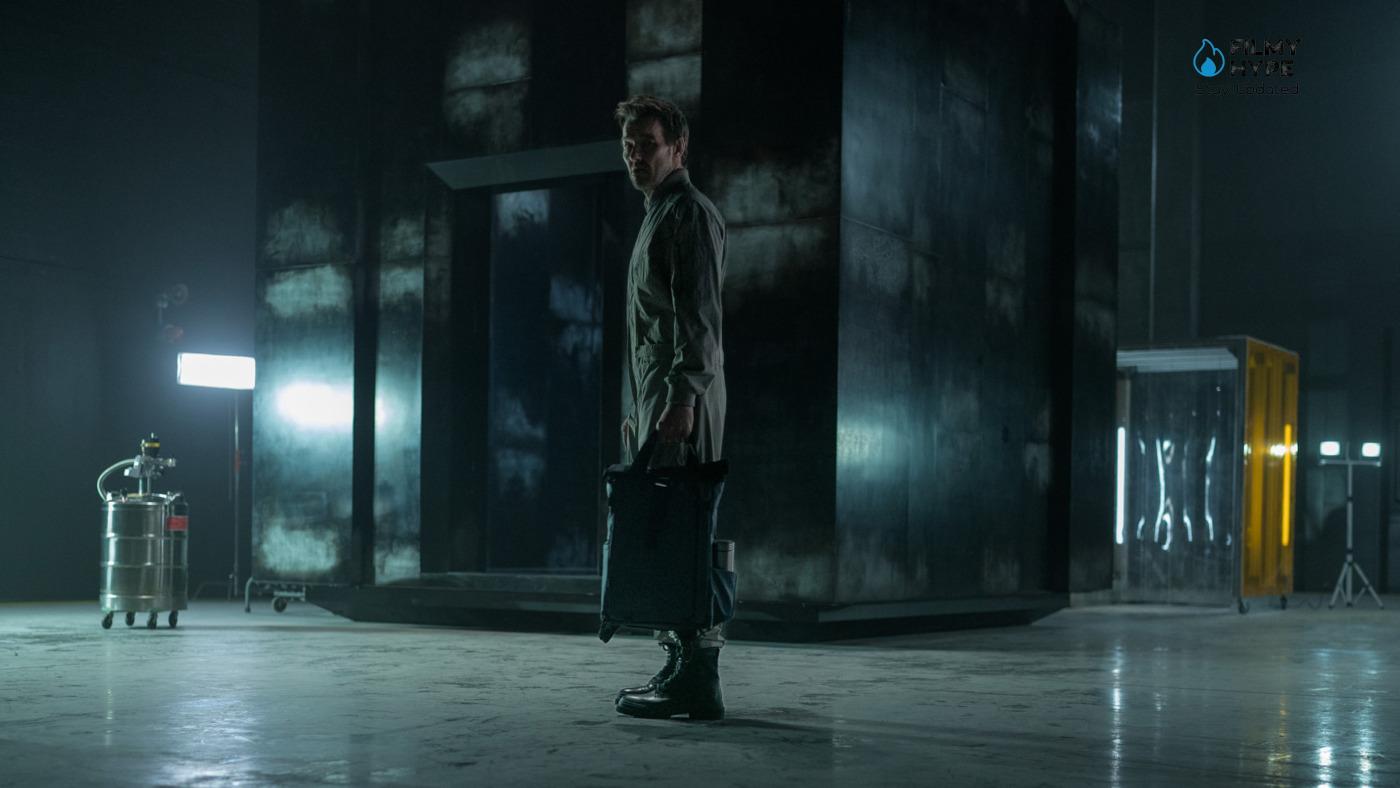Dark Matter Series Review: Apple Tv+ Series Between Parallel Worlds and Schrödinger’s Cats
Cast: Joel Edgerton, Jennifer Connelly, Alice Braga
Created By: Blake Crouch
Streaming Platform: Apple TV+
Filmyhype.com Ratings: 4/5 (four stars)
With the release of the first two episodes out of eight, the first season of Dark Matter, a science fiction TV series (and we have already explained the hyphen) based on the New York bestselling novel, will be available on Apple TV+ from 8 May 2024. Times by Blake Crouch. If you like those films, those TV series, in short, those fantasy stories that make you think and rethink what you would do if you found yourself in similar exceptional circumstances, Dark Matter is one of those titles that you can’t miss. It talks about parallel dimensions and choices in life, a possibility that we have all thought about at least once in our lives and which here scientifically takes shape. However, if you are part of that category of people who when they see a film about time travel notice any inconsistency, or who when they follow a science fiction TV series are indignant at every objective error, we warn you immediately that you could find yourself at the end of Dark Matter with deep dissatisfaction. To explain better, let’s get to the heart of the review with a spoiler-free summary of the plot.

There is no doubt that the theme of the multiverse is experiencing a moment of unprecedented popularity among the general public, especially thanks to some of the recent Marvel Studios productions (on the small screen we have examples such as Loki, while on the great Doctor Strange in the Multiverse of Madness). A trend that has also affected productions outside the colorful universe of the MCU, such as the Oscar-winning phenomenon Everything Everywhere All at Once and the Apple TV+ TV series Constellation, more oriented towards serious science fiction tinged with thriller notes. Apple itself, this time in collaboration with Sony Pictures Television, returns to the charge with another serial product with a similar subject: Dark Matter, where the science fiction author Blake Crouch has personally adapted his novel of the same name (his trilogy of books on Wayward Pines had already inspired the series produced by M. Night Shyamalan).
Dark Matter Series Review: The Story Plot
Years ago, Jason Dessem chose to create a family with his wife Daniela and gave up his career as a researcher: he is a good father to his son Charlie, and he teaches physics to lazy university students, but he can’t help but feel a pinch of bitterness for his former friend Ryan who, after continuing their research, was awarded the prestigious Pavia prize and is preparing to become a world-famous entrepreneur in the field of neurotechnology. One evening, Jason is kidnapped and drugged by a masked man. When he wakes up, everything has changed: he is now a leading figure in the futuristic research center Velocity, led by the unscrupulous Leighton Vance. He is the one who won the Pavia prize, but there is no longer any trace of his wife and son: at his side, there is only his assistant Amanda, with whom he shares a superficial relationship. In this alternate reality, Jason put career before love, and everything evolved accordingly.
Meanwhile, an alter ego of his is trying to replace him in his life as a good family man and steal his existence without attracting attention. Do you know the famous theory of Schrödinger’s cat, which is both alive and dead at the same time as long as it is in a box isolated from the outside world? Somehow, “Jason-2” seems to have found a way to truly build that box, with which he can explore the paths he chose not to take in the past. Don’t be fooled by the premise, however: as the episodes go by, this story will prove to be much more human, intense, and authentic than the many (too many?) stories about the multiverse that crowd the small and big screen these days…

Dark Matter, compared to the over-the-top ideas of the comics and EEAAO, tackles interdimensional travel with a more purely sci-fi approach, where there is space for some suggestions based on famous scientific theories (the means that allows you to move between the various realities is a giant box of Schrödinger’s cat paradox). In this world, there is no room for colorful fantastic flights, where the boundary between science fiction and magic is blurred. The approach chosen by the Apple series is close to the cold and analytical one of authors such as Denis Villeneuve Christopher Nolan (especially the latter exemplary, who in his Inception represented the world of dreams, limiting the dreamlike component, between aseptic interiors and architectural structures brutalist).
Dark Matter Series Review and Analysis
Dark Matter, an Apple TV+ series, based on the science fiction novel of the same name by Blake Crouch (who collaborated on the script), takes advantage of quantum magic to imagine other possible life paths for its protagonist Jason, played by Joel Edgerton, also producer of the show. A physics teacher at a college in Chicago, Jason is happily married to Daniela, an artist, and has a fifteen-year-old son, Charlie, with her. Invited by a neuroscientist colleague to celebrate the (large) scholarship won by the latter, Jason gets drunk and ends up the victim of a kidnapping. When he wakes up, he finds himself in another existence, in which the crossroads of fifteen years earlier – choosing between family life and an academic career – has been resolved in another direction. Now, however, it is up to Jason to understand whether the untaken and now viable alternative is better than the previous one and whether, if the previous one is ultimately preferable, it is possible to go back.
The plot, more intricate than how to avoid spoilers, has been summarized, betrays, despite its brevity, two of the souls of the series: on the one hand, the comparison between scientific reasons and ethical concerns typical of the sci-fi genre, a genre that takes vitality from the mysteries of nature and bends them to an investigation into the unknown, not only outside of us but also inside us that resists understanding and rational decoding. Dark Matter is not only what can only be tapped into indirectly, through the detection of its effects, but also that impenetrable kernel of otherness that dwells in the human being, his lumpy heart of darkness. On the other hand, Dark Matter would seem to follow quantum not only to unravel Jason’s existentialist question. “And if I had made another decision, fifteen years ago, now I too would be a star of scientific research?”

He doesn’t just ask whether, like the grains of atoms, even our little lives could ‘consume’ simultaneously in different parts of the universe, without mutually excluding each other. It also does something else: it multiplies the possible worlds and the passages that allow Jason to inhabit them all. Matter can behave like a body or a wave: Dark Matter follows Jason’s body in its passages from one existential box to another, but it also tries to stage the consequences produced by the refraction resulting from the wave movement, the mechanism of superfetation of this ubiquitous body, the confusion and fragmentation that its simultaneous existence in multiple places generates. In short, he does something very complex that inevitably requires the viewer not only attention and patience but also a certain predisposition to undertake an intellectual adventure, a psychedelic trip into the quantumly ‘sustainable’ absurdity of the multiverse. However, both the operation of enhancing the inventive mechanisms.
Relying too much on the basic idea, on the ‘algorithmic’ instructions that make the story proceed – and the softening of a writing that is too monotonous and tragically devoid of intimate charms, both the aseptic atmospheres – some would say necessary for the genre, but in the long run too vacuously aestheticizing – cool the sentimental material of the representation. From this excess of coldness, from this dramaturgical robotism, a paradox arises, upon closer inspection: Dark Matter doesn’t work entirely precisely because everything works too much. Talking about parallel dimensions is always terribly complicated because the risk of telling stories that don’t stand up is very high. Suffice it to say that even an acclaimed TV series like The Man in the High Castle was unable to close its story worthily (after all, parallel dimensions never meet…).
On Apple TV+, Constellation has fared well recently. Dark Matter, on the other hand, does not fully succeed – in our opinion – in its aim of convincing the public of the fantastic story it tells. The premise is fascinating and, even if not very original, it captures attention, the story flows with many interesting ideas and is certainly well-directed and well-acted. However, as we will explain better in the analysis of the season finale, Dark Matter gives the impression of having stretched its story too much, with the result of highlighting its limits even more. In other words, if Dark Matter had been a film, it would have been better, because it would have given less scope to narrative lines that, when too exposed, raise questions that have no valid answers. But this is probably just the point of view of those who ask too many questions.

On the other side of the multiverse, the series follows the moves of the other Jason; a more self-confident and impulsive version of our hero, intent on gaining the trust of his new family without arousing suspicion (for the stranger from the other dimension, social media will prove to be a fundamental resource for finding useful information). Another part is full of tension, where Daniela’s suspicions begin to grow more and more due to the bizarre and disturbing behavior of her husband. Although travel into parallel dimensions is no longer a novelty in the world of mainstream entertainment, Dark Matter still manages to build an intriguing narrative around this element, which exploits the codes of the thriller to keep the viewer’s attention high. The peaks of anxiety of the recent Constellation are not reached, but the result is certainly worth watching.
If Dark Matter manages to stand out from the many other contemporary stories (comics and otherwise) that explore the multiverse and the theory of parallel worlds, much of the credit goes to its protagonist Joel Edgerton. The Australian star of Warrior, The Green Knight, and Master Gardener – discovered and launched by George Lucas as the interpreter of Uncle Owen in the Star Wars prequels – seems to find his ideal dimension here, and gives us an intense, genuine and dramatic performance in the role of the protagonist’s two alter egos. In outlining “Jason-1” and “Jason-2”, Edgerton manages to outline what is and remains a single character, solid and convincing, without ever giving in to the temptation to exaggerate the differences, deform the psychological features or outline two caricatural profiles antithetical: his two Jasons are in all respects the same person, although they have gone through very different circumstances.
In addition to shining with depth and good characterization, Edgerton’s character manages to capture the essence of the multiverse thanks to careful work on micro-expressions and postural details highlighted by the camera. Completing the work is an exceptional cast of supporting actors formed – among others – by Jennifer Connelly, Alice Braga, and Jimmy Simpson: the result is a profound, three-dimensional story firmly anchored to its characters. Unlike the vast majority of science fiction series, Dark Matter does not place suggestive scenarios, futuristic hypotheses, and worlds to explore at the center of the narrative. To be honest, the “theoretical” component that underlies Dark Matter is the simplest, and all in all, already seen (although not obvious) part of the overall picture.

What makes the new series original and particularly worthy of interest is, if anything, the choice to focus on the characters and their humanity, which is accompanied by the desire to avoid at all costs accelerations and sudden “flights forward” that would be difficult to reconcile with the credibility of the story. Dark Matter is a down-to-earth science fiction thriller that challenges the viewer’s intelligence and rewards attention to detail, always proceeding at the right pace: throughout the nine episodes, information is deliberately sipped by the writer-showrunner Blake Crouch, who manages to assert his undeniable talent as a storyteller even behind the camera. Even the technical sector, as almost always happens on Apple TV+, is of a high profile, and contributes to enriching the platform’s catalog with yet another high-quality series.
Dark Matter Series Review: The Last Words
Dark Matter uses the language of science fiction sparingly to outline a multiverse that is finally “on a human scale”: also thanks to an amazing Joel Edgerton, the writer-director Blake Crouch gives us a solid and compelling story. The concept of a multiverse is no longer new to the world of mainstream entertainment. After the recent Marvel Studios productions and the success of Everything Everywhere All at Once, Apple tried to set up another series built around the fascinating theory of parallel worlds. Created by Blake Crouch, who adapted his novel of the same name, Dark Matter presents a cold and analytical science fiction story. A series that manages to keep the viewer’s attention high by exploiting the codes of the thriller, where a mild-mannered physics teacher is catapulted into a dangerous adventure in the multiverse. A result that is certainly worth watching, even though the subject is now starting to feel like it has already been seen.







